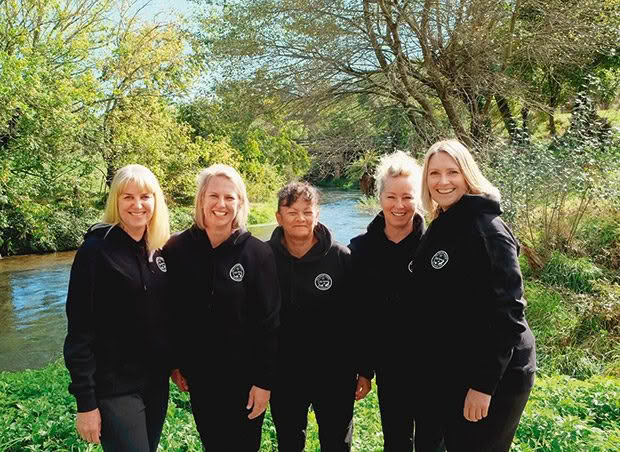Why this competitive fisher is angling for more women to give fly fishing a go

From left: Suzie Foggo, Rachel McNae, Heather Carrington, Louise Stuart and Sarah Delany. Photo: Scarlett Glover.
Rachel McNae is playing a lead role in encouraging women to tie flies, step into their waders and go fishing.
Words: Lee-Anne Duncan
As a university academic contributing to research projects worldwide, Dr Rachel McNae is accustomed to video calls. During them — depending on her audience — she might add in a background of a glorious New Zealand river, all deep blues and greens. Sure, it’s pretty, but it’s a tip to Rachel’s happy place.
“My love for fly fishing is about being in the outdoors and exploring new places. Because my job is relatively theoretical, many outcomes aren’t immediately tangible — publishing a book can take years. Out on the river fly fishing, you can produce a tangible thing instantly — a fish.”
Rachel’s been fly fishing for as long as she could handle a rod, starting alongside her dad and her brother on family holidays in the central North Island and mucking about in the river that ran through their Kerikeri farm. Now Hamilton-based, she is the director of the Centre for Educational Leadership Research at the University of Waikato, with a particular interest in women’s leadership, setting her up nicely to encourage more women into the sport of freshwater fishing.
View this post on Instagram
“For years, it felt like I was the only female out on the river. I come from a place of social justice and fairness, so when I recognized women’s absence on the water, I wanted to make a difference. There’s a good mesh between what I do as a job — transferring those skills across to support other women to either lead, gather together or simply to participate.”
Rachel has been competitive fishing for the past four years. Inspired by an introductory workshop held by Australian competitive angler Casey Pfeiffer, she dedicated herself to training, extending her knowledge and skills. Soon after, she was selected to represent Aotearoa at the Commonwealth Fly Fishing Championships in 2020. She was named as one of two women in the team, the first time it had included more than one female.
Since she started competing, Rachel worked with fishing clubs and Sport Fly Fishing NZ (where she’s the only woman on the national board) to run women’s development programmes, “learn to fish weekends”, and social tournaments, slowly enticing more women onto the river and into a competition.
It has worked. Rachel says half the field were women at a fly-fishing competition earlier this year, which until now, was “unheard of”. Those women are performing at such a level that Sport Fishing New Zealand selected its first all-women team to compete on the world stage this year.
They’re the NZ Fly Ferns — five women (with Rachel as their captain), taking out top spots at competitions.
“Some countries have had women’s fly fishing teams for years. Some teams are even paid to fish professionally. That’s not us — yet. We’re grafters, holding down jobs, balancing busy lives and family commitments. But we work hard to get on the water as much as possible, training after work and during weekends.”
If that all sounds like hard work, Rachel says it’s easy to remember why she loves to fish. “It’s the joy, the simplicity and the sisterhood. For me, fishing is mindful. It gives me permission to pause and witness nature in all her beauty. And, also, enjoy the special moments on the water with my father, an excellent angler, and my daughter, as she fishes, too.” In fact, 10-year-old Alexis is part of Fly Girl Global, a group of about 50 girls worldwide who bonded together online during the Covid-19 lockdowns and learnt to tie flies on Instagram.
While she says New Zealand has some of the best rivers anywhere, her favourite spot — so far — has been Denver, Colorado. “That was pure magic. There were bald eagles, ice down to the edges of the stream, snow-capped fir trees, a moose on the side of the river, and stunning fish. I treasured every minute.”
She says the women still come across the occasional angler who makes assumptions about them and “steps in front” of them on the river (which is not done), but most are supportive and generous with their knowledge and time. However, she notes that’s starting to wane as more women step higher on the podium. In a further win, Rachel says: “We now have portaloos at the competitions.”
THE NZ FLY FERNS
Sport Fly Fishing NZ’s first all-women team to represent the country at the world championship level is (pictured from left) Suzie Foggo, Rachel McNae, Heather Carrington, Louise Stuart and Sarah Delany. “We’re a diverse group of women,” says Rachel, the team’s captain. “We have different jobs, different backgrounds. We all bring our different strengths and skills.”
In a fly-fishing competition, each competitor is allocated a section of a river for a set time, with a controller nearby, looking on. When a fish is landed, it’s taken to the controller in a net and its length measured and recorded. Competition fly-fishers have strict protocols, ensuring the fish stays in the water, is quickly and carefully freed from the barbless hook, then gently released. The controller must observe it swim away. Points are given for catching the fish and for fish length. In a team situation, the team’s points are compiled together.
“The great thing with our team is that no one’s in it for themselves,” says Rachel. “We’re in it because we love trout fishing. We want to grow the sport and have a respected presence.”
Love this story? Subscribe now!
 This article first appeared in NZ Life & Leisure Magazine.
This article first appeared in NZ Life & Leisure Magazine.
